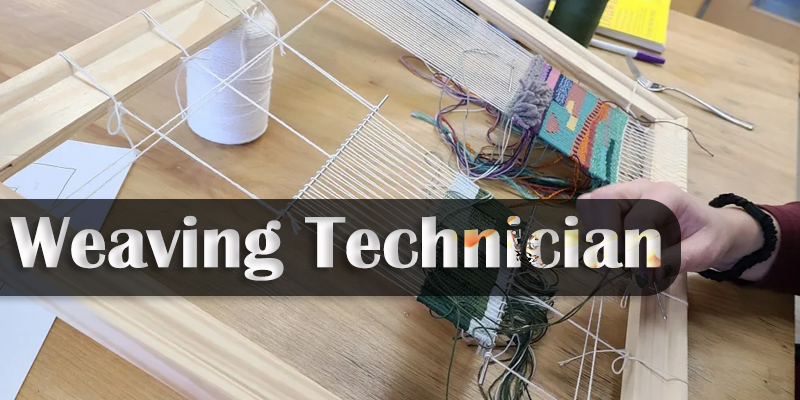
ITI Weaving Technician Syllabus (English)
Course Overview
-
Trade Name: Weaving Technician
-
Duration: 1 Year (2 Semesters)
-
NSQF Level: Level 4
-
Eligibility: 10th Grade Pass with Science and Mathematics
-
Objective: To train candidates in operating and maintaining weaving machinery for producing fabrics, preparing them for roles as weaving technicians, loom operators, or self-employment in textile production and design services.
-
Certification: National Trade Certificate (NTC) by NCVT
Detailed Syllabus
Semester 1
Trade Theory
-
Introduction to Textile Industry: Overview of weaving, types of fabrics (cotton, silk, synthetic), textile industry scope.
-
Safety Practices: PPE (gloves, earplugs, masks), machine safety, fire hazards, first aid in textile units.
-
Fibre and Yarn: Natural fibres (cotton, wool), synthetic fibres (polyester, nylon), yarn properties (count, twist).
-
Weaving Preparatory Processes: Warping, sizing, beaming, drafting; their role in fabric production.
-
Loom Types: Handlooms, power looms, shuttle looms; components (warp beam, heddles, shuttle).
-
Weaving Fundamentals: Plain weave, twill, satin; shed formation, picking, beating-up.
-
Basic Maintenance: Lubrication, cleaning looms, checking belts and pulleys.
Trade Practical
-
Safety Drills: Wearing PPE, practicing emergency stops, using fire extinguishers.
-
Yarn Handling: Identifying yarn types, measuring yarn count, checking twist direction.
-
Warping Practice: Preparing warp beams, aligning threads uniformly (±1 mm accuracy).
-
Loom Setup: Threading heddles, tying warp ends, adjusting tension on power looms.
-
Weaving Tasks: Operating handlooms to produce plain weave fabric (1x1 m).
-
Maintenance Work: Cleaning loom parts, oiling bearings, inspecting shuttle condition.
-
Project Work: Weave a 2x1 m cotton fabric sample with plain weave, ensuring even selvedge.
Hours: Theory: 160 hours | Practical: 240 hours
Semester 2
Trade Theory
-
Advanced Weaving Techniques: Dobby, jacquard looms; producing complex patterns (herringbone, damask).
-
Automatic Looms: Rapier, air-jet, water-jet looms; automation features, productivity benefits.
-
Fabric Defects: Causes of defects (broken ends, slubs, mispicks), quality control methods.
-
Textile Calculations: Warp/weft density, fabric weight, production rate calculations.
-
Electrical Systems: Motors, sensors in automatic looms; basic troubleshooting.
-
Environmental Practices: Waste yarn recycling, water conservation in sizing, eco-friendly dyes.
-
Entrepreneurship: Starting a weaving unit, market trends (e.g., sustainable fabrics).
Trade Practical
-
Dobby Weaving: Setting up dobby looms, weaving twill patterns (2x1 m fabric).
-
Automatic Loom Operation: Operating rapier looms, adjusting pick density (±2 picks/cm).
-
Defect Analysis: Inspecting fabric for defects, correcting issues like loose ends.
-
Quality Control: Measuring fabric GSM (grams per square meter), checking weave consistency.
-
Electrical Maintenance: Checking motor connections, replacing loom sensors.
-
Eco Practices: Recycling waste yarn, optimizing water use in sizing process.
-
Project Work: Produce a 3x1 m jacquard fabric with a custom pattern, ensuring defect-free output.
Hours: Theory: 160 hours | Practical: 240 hours
Additional Components
-
Workshop Calculation and Science
-
Calculations: Yarn count conversion, loom speed, fabric cost estimation.
-
Science: Fibre tensile strength, friction in weaving, dye chemistry basics.
-
Hours: 80 hours/year
-
-
Engineering Drawing
-
Drawings: Loom layouts, weave diagrams (plain, twill), warp/weft patterns.
-
Hours: 80 hours/year
-
-
Employability Skills
-
Communication: Coordinating with designers, reporting production issues, client interaction.
-
IT Literacy: Using textile design software, inventory systems, online fabric catalogs.
-
Soft Skills: Time management, teamwork, resume writing, interview preparation.
-
Hours: 60 hours/year
-
Assessment and Certification
-
Exams:
-
Theory: Written exams per semester (MCQs, descriptive questions).
-
Practical: Operating looms, weaving samples, defect analysis, maintenance tasks.
-
-
Evaluation Criteria: Fabric quality, weaving accuracy, safety compliance, machine handling efficiency.
-
Certification: NCVT National Trade Certificate (NTC), globally recognized.
Career Opportunities
-
Employment: Weaving technician, loom operator, quality inspector in textile mills, garment industries, or export units.
-
Self-Employment: Textile production unit, custom fabric design services, consultancy for weaving setups.
-
Further Studies: Diploma in Textile Technology, certifications in textile design or loom automation.
Trade Type
- 6 views